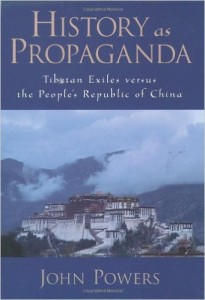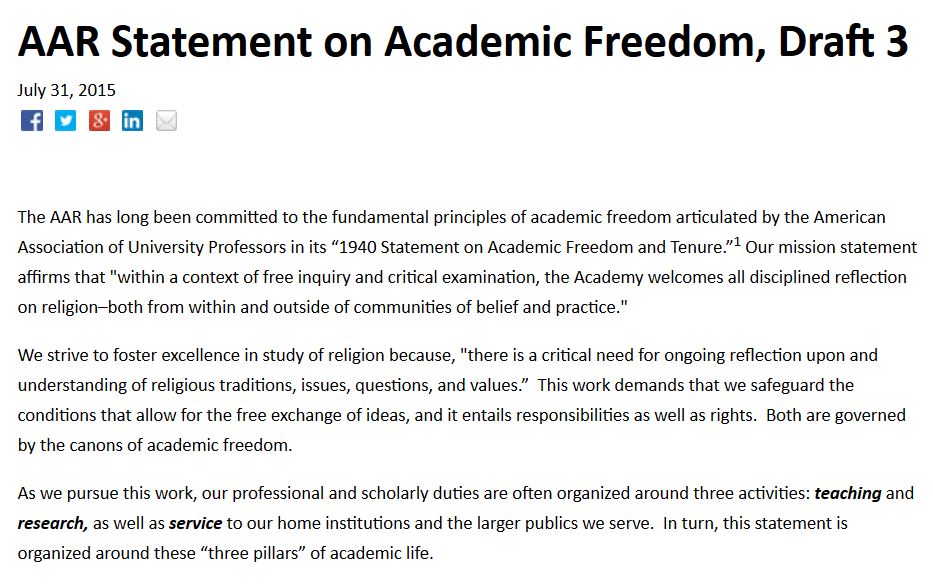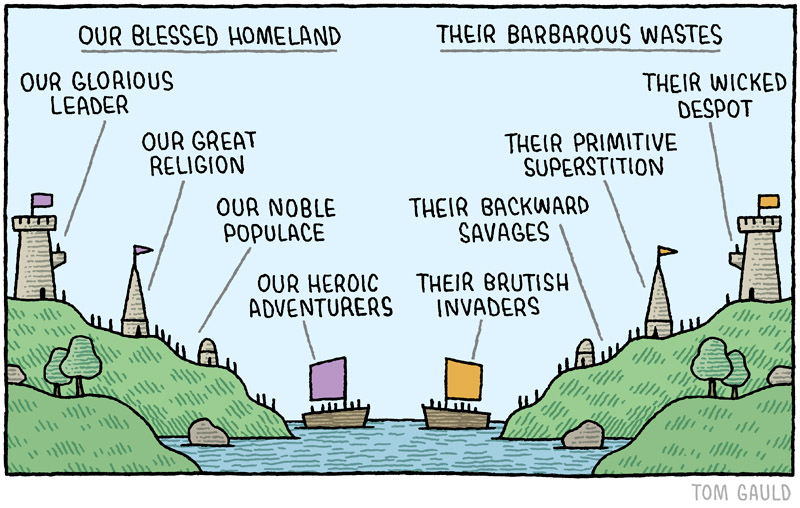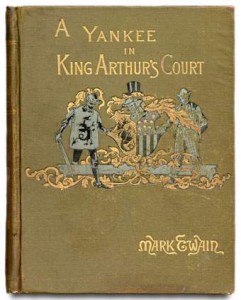

A Peer Reviewed Blog

 In History as Propaganda: Tibetan Exiles versus the People’s Republic of China, John Powers surveys a wide variety of histories of Tibet, written by Tibetan, Chinese, and western (i.e., American or European) authors. The story of the relations between China and Tibet — is Tibet an independent state or merely a small part of China’s empire? — can be told in many different ways, depending on the interests or agenda of the author spinning the narrative. Of particular interest to me is how Powers notes the normative vocabulary of the historians he surveys. The authors tend to systematically use normative nouns and adjectives — with positive and negative valuations attached to them — in their narratives. See the following two tables: Continue reading “On the Systematic Use of Normative Vocabulary”
In History as Propaganda: Tibetan Exiles versus the People’s Republic of China, John Powers surveys a wide variety of histories of Tibet, written by Tibetan, Chinese, and western (i.e., American or European) authors. The story of the relations between China and Tibet — is Tibet an independent state or merely a small part of China’s empire? — can be told in many different ways, depending on the interests or agenda of the author spinning the narrative. Of particular interest to me is how Powers notes the normative vocabulary of the historians he surveys. The authors tend to systematically use normative nouns and adjectives — with positive and negative valuations attached to them — in their narratives. See the following two tables: Continue reading “On the Systematic Use of Normative Vocabulary”

This post originally appeared on the Practicum blog.
In Religion & Society—my introductory religious studies course — I regularly use the 1998 comedy Pleasantville to engage in a discussion about how we’re socialized to actively seek conformity to the existing social order. The film is about two teens — David, played by Tobey Maguire, and Jennifer, played by Reese Witherspoon—who are magically transported from the 1990s into a 1950s sitcom; they immediately begin to chafe under the social expectations of small town life. As they start deviating from the social norms of the fictional sitcom world (and encourage others to do so as well), they disrupt the life of the entire town. (If you haven’t seen it, the trailer is below. Note: there are spoilers further down.) Continue reading “Pleasantville and Social Reproduction”

As a college professor I often hear faculty lament the students we have “these days”; there’s a nostalgic decline-and-fall narrative we tell, according to which we’re far removed from the golden age when students were prepared for college and could actually read and write upon arrival. If only we could return to the seventeenth century, when students came to college reading Latin and knowing their Seneca and Cicero!
However, when this narrative is shared (and, to be honest, I’ve told the tale myself), what I hear — what that narrative seems to implicitly suggest — is this: things were better back in the old days, before they let a lot of women and blacks and kids from the working class into college. Continue reading “The Golden Age”
 Recently, the Board of Directors of the American Academy of Religion released a draft update to its 2006 statement on Academic Freedom and the Teaching of Religion and solicited feedback from members. Given that the members of Culture on the Edge are all scholars of religion, some have opted to offer their feedback to the AAR via this short series of posts on our site. (An index to all the posts in this series can be found here)
Recently, the Board of Directors of the American Academy of Religion released a draft update to its 2006 statement on Academic Freedom and the Teaching of Religion and solicited feedback from members. Given that the members of Culture on the Edge are all scholars of religion, some have opted to offer their feedback to the AAR via this short series of posts on our site. (An index to all the posts in this series can be found here)
Craig Martin
I’m extremely grateful to the AAR for including reference to the AAUP’s statement on collegiality; the requirement of collegiality and civility are potentially directly opposed to academic freedom. However, as Merinda Simmons noted earlier in this series, there appears to be a tension between those comments on collegiality and civility, on the one hand, and the recommendation that we be respectful, sensitive, patient, humble, and generous, on the other. The definitions of the former terms overlap largely with the definitions of the latter. Wikipedia—a good source of information about colloquial uses of words—reports that collegiality *involves respect* toward others. So we are to be respectful to others, but institutions cannot demand that we be respectful (i.e., collegial) toward others? Continue reading “Response to the American Academy of Religion’s Statement on Academic Freedom, Part 3”
 Recently I’ve been enjoying reruns of 3rd Rock from the Sun on Hulu. For readers unfamiliar, this NBC sitcom ran from 1996 to 2001 and focuses on four aliens that came to earth in the 1990s to do anthropological research on our species. The humor of the show is of course based on cultural misunderstandings as the aliens — residing in Ohio, USA — attempt to “fit in” and understand the locals. As in such shows, of course the audience learns more about being “human” by watching these aliens become humans themselves.” Continue reading “The Brilliance of Containing Whiteness”
Recently I’ve been enjoying reruns of 3rd Rock from the Sun on Hulu. For readers unfamiliar, this NBC sitcom ran from 1996 to 2001 and focuses on four aliens that came to earth in the 1990s to do anthropological research on our species. The humor of the show is of course based on cultural misunderstandings as the aliens — residing in Ohio, USA — attempt to “fit in” and understand the locals. As in such shows, of course the audience learns more about being “human” by watching these aliens become humans themselves.” Continue reading “The Brilliance of Containing Whiteness”

This is the first of two posts from the Edge on what is currently happening in Baltimore…
The recent protests in Baltimore have gained widespread media attention in the US, especially the level of violence to which the protesters have risen. It seems that both whites and African Americans are lamenting the actions of the violent protesters. One young African American man in Baltimore took to YouTube with this commentary, ending up on the front page of Reddit: Continue reading “On the Demonization of Violent Resistance”

Original post can be found here.
Many of you will have seen Steven Ramey’s recent post on how nacho cheese is a floating signifier: it lacks a legal definition and, as such, its use is recreated on an ongoing basis by different social actors, many of whom profit from peddling their wares as “nacho cheese.”
Steven’s post was picked up and commented on by Timothy Michael Law at Marginalia. While reading, I noticed a provocative juxtaposition between the nacho cheese comments and an advertisement for other Marginalia content:
 “Israel,” like “nacho cheese,” is a floating signifier subjected to ongoing recreation and contestation. In fact, the quotation from Steven’s post would be just as true if we swapped the terms: Continue reading “Israel Is Nacho Cheese, Or Why You Should Study Religion”
“Israel,” like “nacho cheese,” is a floating signifier subjected to ongoing recreation and contestation. In fact, the quotation from Steven’s post would be just as true if we swapped the terms: Continue reading “Israel Is Nacho Cheese, Or Why You Should Study Religion”

For a new Culture on the Edge series “You Are What You Read” we’re asking each member to answer a series of questions about books — either academic or non-academic — that have been important or influential on us.
3. Name one of your favorite books that’s not a theory book.
 Naming two books is cheating I guess, but I adore Mark Twain’s The Adventures of Huckleberry Finn and A Connecticut Yankee in King Arthur’s Court. As Twain grew older — at least as I read him — he became almost as skeptical about morality as was Nietzsche. For Twain, humans are neither good nor evil; rather, human behavior simply follows from the processes socialization to which we’re subjected from the cradle, and moral evaluations of human behavior are not based on a universal ethics but are always relative to the sympathies with which one has been socialized. Consider the narrator’s commentary in Connecticut Yankee: Continue reading “You Are What You Read, with Craig Martin (Part 3)”
Naming two books is cheating I guess, but I adore Mark Twain’s The Adventures of Huckleberry Finn and A Connecticut Yankee in King Arthur’s Court. As Twain grew older — at least as I read him — he became almost as skeptical about morality as was Nietzsche. For Twain, humans are neither good nor evil; rather, human behavior simply follows from the processes socialization to which we’re subjected from the cradle, and moral evaluations of human behavior are not based on a universal ethics but are always relative to the sympathies with which one has been socialized. Consider the narrator’s commentary in Connecticut Yankee: Continue reading “You Are What You Read, with Craig Martin (Part 3)”